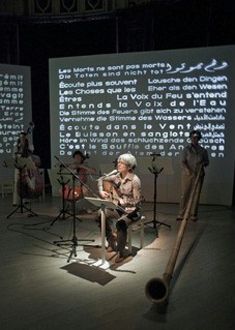Music Theatre
Mela Meierhans: Rithaa - Ein Jenseitsreigen II
Arabic laments and death rituals

Hereafter Trilogy part II (2010) WP/CW
A music theatre with Kamilya Jubran
Texts by Al-Khansa, Judith Butler, Birago Diop, Salman Masalha, Hassan Najmi
ensemble dialogue: Kamilya Jubran, vocals/oud | Leslie Leon, mezzo soprano | Anna Spina, viola | Claudia Eigenmann, violoncello | Cristin Wildbolz, double bass | Meinrad Haller, clarinets | Diane Eaton, horn/alphorn | Anita Kuster, trombone/alphorn | Françoise Rivalland, percussion/santur
Sandra Gysi / Ahmed Abdel Mohsen, film | Charlotte Frisch, choreography | Ina Boesch, dramaturgy | Regina Lorenz, costumes | Martin Müller, stage/lighting design | David Buser, technical director/lighting design | Hebba Sherif / Maysoon Mahfoudh, scientific advice | Johanna Schweizer / Ursula Freiburghaus, project coordinator |
A commissioned work by Gare du Nord basel
A co-production of Gare du Nord/Bahnhof für Neue Musik Basel and MaerzMusik | Berliner Festspiele, faciltated by German Federal Cultural Foundation and Pro Helvetia
Berliner Festspiele in co-operation with Haus der Kulturen der Welt and Pro Helvetia Cairo
*
Cross-cultural musical projects are becoming increasingly popular, although often they result in clichéd exoticism. This is not the case as far as the Swiss composer Mela Meierhans is concerned. When she ventures into such territory, musical worlds rub up against one another electrically. As such, she created in 2006 in Tante Hänsi, the first part of her afterlife trilogy on death rituals and performed at MaerzMusik 2007, a work in which accomplished vocals and Swiss yodelling are contrasted – an ear opener for both genres. She goes a step further with Rithaa – Ein Jenseitsreigen. In this second part of the trilogy, she not only allows contemporary European music to meet contemporary Arabic music, but also composes – in collaboration with the Palestinian composer Kamilya Jubran – a sensitive exchange between the Orient and the Occident. A tone series derived from the letters of the Latin and Arabic alphabets forms the basis of this compositional encounter. Since it is frequently still a woman’s responsibility to mourn the dead, the female voice is at the centre of Rithaa, which devotes itself to Arabic laments and death rituals. To be exact, three female singers: Kamilya Jubran, known in the Arabic world above all as a singer, the mezzo-soprano Leslie Leon from Germany and Nawal Noah, an Egyptian professional mourner who, although not physically present on stage, will feature in a film projection (by Sandra Gysi and Ahmed Abdel Mohsen). The three women represent different sound traditions, in their voices the Arabic mixes with the European musical world. So multifaceted is the depth of sound, so Babylonian is the babble of languages. Based on texts by contemporary Arabic poets, the legendary pre-Islamic poet Al-Khansa as well as the American Philosopher Judith Butler, the three women recite and sing in Arabic, German and English. They will be musically accompanied by the ensemble dialogue. Martin Müller (lighting/stage design), Charlotte Frisch (choreography) and Thea van Woland (Visual Arts) are responsible for the conceptual design of the performance space. After commissioning part I, Gare du Nord, Bahnhof for New Music in Basel also commissioned part II. The work will be realised as a co-production by Gare du Nord with the festival MaerzMusik and in collaboration with Pro Helvetia Cairo. Rithaa – Ein Jenseitsreigen is sponsored by Kulturstiftung des Bundes and the Swiss Arts council Pro Helvetia.
Links: www.meierhans.info